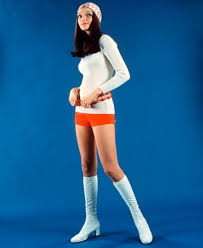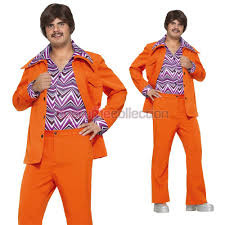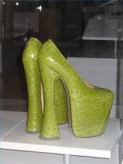“Jesus Christ, it’s 1979. Why do they need to get married? They’ve been living together for five years. No one in the family disapproves. Why do people feel compelled to have the state sanction their relationships?” Don let me rave. Neither of us could answer these rhetorical questions. He couldn’t have been any less enthusiastic about our brother Tim’s wedding than I was. We knew that neither of us would ever have a family wedding with all the attendant fussing, well-wishing, presents and cultural sanction, not that either of us would want one.
“You don’t suppose there’s any way we can get out of going,” he said in a resigned tone.
I considered this. Our attendance seemed like a small price to pay to avoid the disapprobation that surely would result from our absence. “We can stay in the background. At least we’re not being asked to be bridesmaids.”
I could hear my brother sigh on the other end of the phone. “To be a bridesmaid,” he said, “has always been a great fantasy of mine.”
“I see what you mean. If I could be best man, I could rent a tuxedo. Fuck! What will I wear?” Don was silent, and I knew he wasn’t worrying about what I’d be wearing.
“Don, if you’re thinking about wearing a dress, just forget it right now. This is not the big city or some trendy college community. This is cowboy country. You’ll get the shit kicked out of you.”
When we said goodbye, I wasn’t entirely sure I’d convinced him, and I wondered how my outrageous brother managed to stay alive without me as his constant bodyguard. He insistently challenged assumptions about dress and gender, which was a dangerous thing at a time when the moral majority felt its grasp on the reins of cultural definitions slipping.
The truth was, just by being my natural self, people—both children and adults—were always confronting me about the nature of my gender. They would yell out of windows or from cars as I walked by, “Are you a boy or a girl?” Or I would be mistaken for a gay man. “Faggot!” they would yell, and speed off before I could correct them: “You idiot! I’m a dyke!”
I had learned that knowledge of gender is extremely important to people. They need this information before they know anything else about you. And once they get you pegged, to be surprised makes them inexplicably angry. All their assumptions are suddenly being challenged. It’s like you’ve called into question some intensely personal assumptions about who they are in the world.
I figured the problem wasn’t me, but how people expected women to look and act. To be feminine required performing unnatural acts—shaving one’s body hair, wearing sticky make-up and carefully coiffed hair, being quiet, wearing odd clothes and uncomfortable shoes, walking with short picky strides. I had practiced these ritual gestures at one time, but the feminist movement had released me. I was free and I was never going back now.

Unfortunately, my freedom from convention left me completely unprepared to dress for Tim’s wedding. I had no dress-up clothes. As a matter of principle I’d stopped wearing dresses in 1970. Since then the contents of my closet had been recycled from thrift stores. As a working electrician in those days of butch dykedom, I could just wash my flannel shirts and jeans and wear them to the bar. No one I knew ever got dressed up, and if they attended weddings, they never told me. So what does a nonconforming, revolutionary lesbian wear to a heterosexual wedding?
At the airport I searched the Nordic crowd of Seattleites for Don’s dark head. I never knew what to expect. He’d been a hippie with a thick ponytail and full beard last time I’d seen him, but personas changed from year to year. He was not at the gate and I wandered until I heard my name called from a waiting area.
Then I saw him, relaxing back into one of the lounge chairs like a queen, newly clean-shaven and wearing giant turquoise butterfly earrings, a flowing scarf wrapped around his shoulder-length hair, tied in back. “I thought it was time to relinquish my male privilege,” he smiled.
In the short 150 miles or so between Don’s home at the foot of the Olympic Peninsula to Yakima, the land cracks and dries up like the edges of those Janis Joplin posters you rehang in each new collective house. Snoqualmie Pass takes you from a rich, dripping, evergreen rain forest over the snow-capped Cascades, past ski resorts and the shorn heads of clear-cut hills in to the Kittitas Valley, flat pasture dotted with Black Angus cattle.
Up over the Manashtash Ridge, a new freeway replaced the winding two-lane road along the Yakima River. Beyond irrigation, only sagebrush–ubiquitous in the valley–flourishes. From the west side of the ridge you can see the town of Ellensburg surrounded by the patchwork of pastures, ground crops and brown earth, and above that the sharp white peaks of the Wenatchee Range. As you continue east, your nose dries up and your hair electrifies, the sky turns intense blue and if there are clouds they look like puffs of bleached cotton. Then, just before the Yakima Valley appears below, if you look to the south, you see the round, white tip of Mt. Adams peering over those dusty brown hills, incongruous.
On that March day the chill air cracked and the sagebrush cast bright shadows on patches of snow as Don drove the Subaru down into the valley past big cattle ranches and their animals with thick winter coats, then smaller farms, past apple and pear orchards just starting to bud.
Our mother, Flo, rushed out to meet us as we pulled into the gravel driveway. She was dressed in her usual polyester pantsuit in bright colors. We hugged her thin frame in turn. Then, as she stood back to look at him, she brushed my brother’s hair away from his face. “Don, I wish you would do something with your hair.” (He had diplomatically removed the scarf.)
Don frowned. “Oh, Mom.”
I thought Don’s hair was beautiful—thick and dark and curly. I’d always wished I had inherited that head of hair from our mother. I might be wearing mine in the same long style. Instead, I wore my straight brown hair short, lately in the shag style Jane Fonda popularized in the movie Klute.
“Ok, you guys, come on in,” she said, “I want you to see the new solar addition Tim put on the house.”
Flo was never much of a housekeeper, but she was a genius at making this century-old farmhouse feel like home. We had bought the run-down five-acre place when I was ten, and remodeled it ourselves. Flo had filled it with antiques she’d collected from junk stores before they were called antiques and priced to match. She always had to show us her new finds.
We visited for a while, then went out to say hello to our younger brothers Tim and Terry, whose four-wheel drive pickups were parked further up the driveway. My parents’ place, which sat down in a hollow, had several outbuildings, all painted Swedish red with white trim like the house. The big old barn had been converted to a garage. Next to it was the chicken house surrounded by its chicken-wire pen. On the other side of the garage was the three-stall horse barn on which I’d painted a stylized picture of a horse years ago. Between them was what we called the doghouse, a rectangular structure that was once a container crate. Someone had given it to my father years ago, and he set it on a slab and cut a door in it saying he’d have a place to go when he was in trouble with Flo. Over the years we’d fixed it up into a nice little apartment with electricity and running water and windows. All of us had used it at one time or another to get away from the house. I’d stayed there on summers home from college. For the past several years Tim and Diana had lived there together.
Tim answered the door, a tall, solid figure with a sparse beard and lanky brown hair. “Hey, how the fuck are you?” he said. We passed hugs around. “I’ve got some great pot this year. We’re just drying out a little.” He pointed to the toaster oven. “Smoke a joint?”
Don smiled. This was what he’d been waiting for. Yakima’s hot dry summers are perfect for growing pot. Tim and Terry grew fine pot when it didn’t get harvested prematurely in the middle of the night by one of their delinquent friends. One year they threw seeds around the farm indiscriminately and plants came up everywhere. One or two flourished in the middle of the gravel driveway.
We threw ourselves on the old foldout sofa. Terry passed out beers.
“So, what’s the plan,” I said to Diana. What family events are we signed up for?”
My girlfriends are giving me a shower tomorrow,” she said. “The wedding’s on Saturday. It will be fun, you guys. We’ll have dinner at the grange hall afterward, and Tim’s friend Duane plays in a band. We can all dance. Tim’s been taking dancing lessons.” Diana was a dancer and a ballet teacher. I don’t believe Tim had ever danced in his life or wanted to.
“What are you wearing,” I asked.
Diana waltzed over to the closet and pulled out a plain white dress that was made interesting by the triangular pieces of green hanging like stalactites from the hem. It reminded me of a costume I’d seen in a performance of Peter Pan. “I made it myself,” she beamed.
“It’s beautiful,” Don and I exclaimed in unison. We looked at Tim.
“Bought a suit,” he shrugged.
“It’s very handsome,” said Diana, replacing the dress in the closet and pulling out a blue suit. “We had trouble getting it to fit in the shoulders. He’s so wide.”
Tim sucked at the joint and then smiled sheepishly.
“Now don’t worry,” Diana said, “You’re going to look great.”
“I have to go shopping,” I said.
The next day my mother and I set out to find me a wedding outfit. Together we slogged through the department stores of my hometown, reliving painful memories of past shopping trips. I had never liked girls’ clothes, and could only be induced to wear a style my mother called “tailored.” Absolutely no frills or puckers. She’d understood. She’d never liked frilly clothes either. But she was five three and slender. I was five eight, and until my twenties, decidedly plump. More often than not, when I found the rare piece of clothing that suited me, it didn’t come in my size. This had always mystified me. I knew there were plenty of other big-boned gals like me, but the people who designed clothes hadn’t discovered us yet.

Sears was filled with nothing but polyester. Pants with no pockets and elastic waistbands. Over the years I’d developed a clothing checklist. I preferred natural fibers, and I wouldn’t wear pants if they had no back pockets. “Don’t be silly,” my mother said.
I was indignant. “I intend to wear these pants more than one time,” I reasoned. “Where will I put my wallet?”
At Montgomery Wards I insisted on starting in the men’s department. I liked the color of a greenish suit on the display and convinced the clerk to let me try it on in the men’s dressing room even though I knew what would happen. Those seventies-style men’s pants were not made for my body. In the size that fit comfortably on my thighs, the waist was inches too big. These were not the kind of pants you could cinch up with a wide belt. They were the kind with the self-belt made of the fabric to fit a man’s waist exactly. When I emerged from the dressing room my mother was not impressed. “Oh, Molly,” was all she said. I knew she was right. I felt like a used car salesman.
We arrived at the Bon Marche irritated and frustrated. The Bon Marche is the Macy’s of Yakima, WA—clothes to aspire to. My attention span for shopping had always been short. And we had never shopped at the Bon when I was a kid. It was out of our price range.
I began to sift through racks of Misses slacks while Flo checked to see whether all the suits had skirts. Suddenly there it was. A rack of pants with back pockets. I was so happy it took me a minute to discover that the pockets were only half-pockets, not really big enough for a wallet. Why they do that I’ll never understand. “Fuck, do they think putting regular-sized pockets in would cause us to grow penises?” I asked my mother.
“Why must you use that word,” she scowled. “Try them on.”
The pants did fit me better than the men’s. I actually liked how they looked, even though I was still pissed about the pockets. “I hate giving money to a clothing industry that refuses to meet my needs,” I said. But I was ready to compromise. I knew I’d never find anything better.
My mother returned with a navy polyester jacket, size 12. Women’s jackets are always too tight in the shoulders or too loose around my waist, but this one wasn’t bad. Before I could complain, she said, “I’ll buy you the jacket.”
Later she asked what shoes I’d be wearing. “Don’t worry,” I said, “I brought my Frye boots.”
Flo insisted I come to the shower, even though the boys didn’t have to. It was just as inane as I’d imagined. Diana was obliged to ooh and aah politely over every gift, no matter how useless. My mother had anticipated that I’d come to this heterosexual event empty-handed and resentful, so she’d bought a present from me. I was as surprised as Diana to discover I’d given her a set of wine glasses with their own rack. Flo never said a word about it.
The day of the wedding I was still searching for an appropriate shirt to wear with my new outfit. My father’s closet had always served me well in the past. We’re about the same size and he has short arms for a man. Whenever I’d visit, he’d send me away with several of his old shirts, which I’d wear with tails out over jeans until they began to fray right at the spots where my ample breasts stuck out the farthest. I found a tasteful light blue number with a faint check. I was looking for a tie when Don breezed into the bedroom. He was wearing bright pink pants and a purple jacket, a pink polo shirt and platform shoes. He sashayed over to the dresser, pulled back his flowing hair and began putting dangly earrings in his pierced ears.
Flo was right on his heels, and she closed the door behind her. “Don,” she wheedled, “I don’t ask you for many things, but I’m asking you not to wear those earrings.”
“Flo, stop making such a big deal out of it,” he said in that artificially low voice he uses when he’s annoyed. “I’m wearing the earrings.”
My mother looked like she might cry. I wished I could make her feel better but I was sworn to defend my brother. “I don’t understand why you must make things so hard for me,” she said. She threw up her hands and walked out.
Before the end of the evening when I felt compelled to admonish my drunken father to stop copping feels off the female guests, he had said to me that he thought I looked “sharp” in his shirt and tie.
Later, when we were dancing, I felt the only wardrobe mistake I’d made was not to wear a bra. I hadn’t thought pointy breasts would really go with my outfit, so I wore an undershirt and let the breasts seek their natural level, about halfway to my waist. But jumping around with no support was painful. Don and I were especially popular on the dance floor, in direct proportion to the amount of alcohol consumed by the wedding guests. I never lacked a partner. All the women loved me.


I still don’t understand why people feel compelled to have the state sanction their relationships!
LikeLiked by 1 person
Dear Valkhrie – The first time I got married to my lesbian partner it started as a protest. If SF was going to break the homophobic status quo and actually respect the civil rights of lesbians and gay men – we were there. I was surprised at how good it felt to stand in SF City Hall and publicly say we intended to spend the rest of our lives together. It felt like a new level of commitment, even though we had exchanged rings years before. Then, as the battle went into the courts, I became more aware of the legal ramifications of marriage in the US, and willing to benefit from things like visitation in hospitals, better joint property rights, and financial family status. As a feminist, I can argue that marriage is a patriarchal institution. But as long as it exists, LGBTQ folk should have access to it without discrimination.
LikeLiked by 2 people